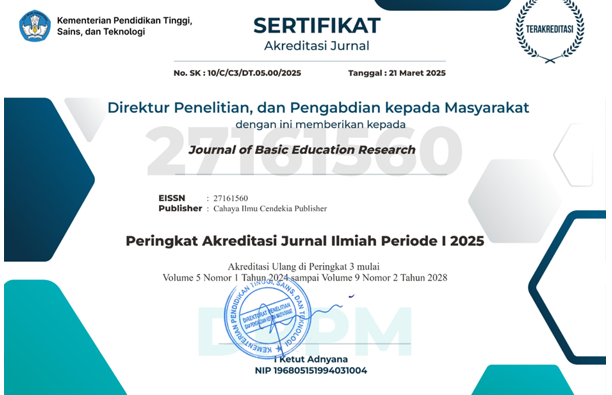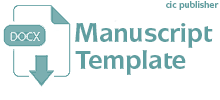The Impact of Unidentified Elementary School Students' Character Values in the Independent Curriculum Class IV Science Science Teacher's Book
Abstract
Purpose of the study: This study aims to analyze the impact of student character values that have not been identified as Independent Curriculum Class IV Science Teacher's Book.
Methodology: The method used is qualitative. Researchers use a document study instrument to collect the required literature, such as soft books/hard books, and others. The sample used in this study was class IV science subjects in the Independent Curriculum teacher's book.
Main Findings: This study shows that in class IV, several character values are not found in students. This is because the teaching and learning process is not directed at these character values. This hurts students, affecting the learning process in class and when students are in their environment.
Novelty/Originality of this study: The latest from this study is to analyze the character value of students in elementary schools in aspects of the independent curriculum.
References
[2] P. E. Prasetyo and N. R. Kistanti, “Human Capital, Institutional Economics and Entrepreneurship as a Driver for Quality & Sustainable Economic Growth,” Entrep. Sustain. Issues, vol. 7, no. 4, pp. 2575–2589, 2020, doi: 10.9770/jesi.2020.7.4(1).
[3] P. Y. A. Dewi and K. H. Primayana, “Effect of Learning Module with Setting Contextual Teaching and Learning to Increase the Understanding of Concepts,” Int. J. Educ. Learn., vol. 1, no. 1, pp. 19–26, 2019, doi: 10.31763/ijele.v1i1.26.
[4] S. Susilawati, D. Aprilianti, and M. Asbari, “The Role of Islamic Religious Education in Forming the Religious Character of Students,” J. Inf. Syst. Manag., vol. 1, no. 2, pp. 1–5, 2022, doi: 10.4444/jisma.v1i1.1.
[5] Y. Hartono, S. Haryanto, and A. Asrowi, “Character Education in the Perspective of Humanistic Theory: A Case Study in Indonesia,” Educ. Int. J. Educ. Stud., vol. 10, no. 2, pp. 95–108, 2018, doi: 10.2121/edu-ijes.v10i2.948.
[6] H. Helda and S. Syahrani, “National Standards of Education in Contents Standards and Education Process Standards in Indonesia,” Indones. J. Educ., vol. 3, no. 2, pp. 257–269, 2022, doi: 10.54443/injoe.v3i2.32.
[7] F. Jannah and R. Fahlevi, “Strengthening the Pancasila character values in forming the character of Pancasilais generation,” in 1st International Conference on Creativity, Innovation and Technology in Education (IC-CITE 2018), 2018, pp. 77–80, doi: 10.2991/iccite-18.2018.18.
[8] U. C. Barlian, S. Solekah, and P. Rahayu, “Implementasi Kurikulum Merdeka dalam Meningkatkan Mutu Pendidikan,” JOEL J. Educ. Lang. Res., vol. 1, no. 12, pp. 2105-, 2022, doi: 10.21608/pshj.2022.250026.
[9] Y. Pratikno, E. Hermawan, and A. L. Arifin, “Human Resource ‘Kurikulum Merdeka’ from Design to Implementation in the School: What Worked and What not in Indonesian Education,” J. Iqra’ Kaji. Ilmu Pendidik., vol. 7, no. 1, pp. 326–343, 2022, doi: 10.25217/ji.v7i1.1708.
[10] K. Kasman and S. K. Lubis, “Teachers’ Performance Evaluation Instrument Designs in the Implementation of the New Learning Paradigm of the Merdeka Curriculum,” J. Kependidikan J. Has. Penelit. dan Kaji. Kepustakaan di Bid. Pendidikan, Pengajaran dan Pembelajaran, vol. 8, no. 3, pp. 760–775, 2022, doi: 10.33394/jk.v8i3.5674.
[11] H. Hersusetiyati and M. P. Chandra, “The Policy of Merdeka Belajar Kampus Merdeka (MBKM) In Synergy With Sustainable Development Goals (SDGs) To Realize Quality Education On Society 5.0,” Int. Conf. Gov. Educ. Manag. Tour. ( ICoGEMT ), vol. 1, no. 1, pp. 1–7, 2022.
[12] Nurhayati, Jamaris, and Sufyarma Marsidin, “Strengthening Pancasila Student Profiles In Independent Learning Curriculum In Elementary School,” Int. J. Humanit. Educ. Soc. Sci., vol. 1, no. 6, pp. 976–988, 2022, doi: 10.55227/ijhess.v1i6.183.
[13] S. Nugrohadi, K. Herwanti, M. Mujiono, S. N. Ardini, and M. Novita, “Analysis of a New Learning Paradigm Based on Kurikulum Merdeka,” Int. Conf. Digit. Educ. Soc. Sci., vol. 1, no. 1, pp. 134–143, 2022.
[14] D. A. Pradana, M. Mahfud, C. Hermawan, and H. D. Susanti, “Nasionalism: Character Education Orientation in Learning Development,” Budapest Int. Res. Critics Inst. Humanit. Soc. Sci., vol. 3, no. 4, pp. 4026–4034, 2020, doi: 10.33258/birci.v3i4.1501.
[15] I. Martiningsih, L. Lisdiana, and S. M. E. Susilowati, “Development of Module Based on Scientific Contextual Additives Material to Increase Learning Outcomes and Science Process Skills in Junior High School,” J. Innov. Sci. Educ., vol. 8, no. 2, pp. 128–137, 2019.
[16] R. S. Malik, “Educational Challenges in 21St Century and Sustainable Development,” J. Sustain. Dev. Educ. Res., vol. 2, no. 1, pp. 9–20, 2018, doi: 10.17509/jsder.v2i1.12266.
[17] L. I. González‐Pérez and M. S. Ramírez‐Montoya, “Components of Education 4.0 in 21st Century Skills Frameworks: Systematic Review,” Sustainability, vol. 14, no. 3, pp. 1–31, 2022, doi: 10.3390/su14031493.
[18] A. P. Astuti, A. Aziz, S. S. Sumarti, and D. A. L. Bharati, “Preparing 21st Century Teachers: Implementation of 4C Character’s Pre-Service Teacher through Teaching Practice,” J. Phys. Conf. Ser., vol. 1233, no. 1, pp. 1–8, 2019, doi: 10.1088/1742-6596/1233/1/012109.
[19] B. Singh, “Character Education in the 21st Century,” J. Soc. Stud., vol. 15, no. 1, pp. 1–12, 2019, doi: 10.21831/jss.v15i1.25226.
[20] E. Khaidir and F. M. Suud, “Islamic Education in Developing Students ’ Characters At As-Shofa Islamic High School ,” Islam. Educ. Dev. Students’ Characters As-Shofa Islam. High Sch. Pekanbaru Riau, vol. 1, no. 1, pp. 50–63, 2020.
[21] M. Asbari and A. Purwanto, “Pancasila Based Character Education to Form Good and Smart Citizens,” J. Community Serv. Engagem. ( JOCOSAE ), vol. 2, no. 4, pp. 11–18, 2022, doi: 10.9999/jocosae.v2i4.62.
[22] N. J. Khoirina, F. H. Al-Majiid, and K. A. Great, “Pancasila Character Education for Millennials in Higher Education: The Future Challenges for Indonesia in Global Prespective,” J. Panjar Pengabdi. Bid. Pembelajaran, vol. 4, no. 1, pp. 55–80, 2022, doi: 10.15294/panjar.v4i1.55019.
[23] W. Akhuai et al., “Social Capital of Pancasila Education in Smart Education with Social Media in Cybercrime Prevention in the Industrial Revolution Era 4.0,” J. Panjar Pengabdi. Bid. Pembelajaran, vol. 4, no. 2, pp. 384–442, 2022, doi: 10.15294/panjar.v4i2.55047.
[24] H. Fajrussalam, K. A. Winata, U. Ruswandi, and A. Nursobah, “Implementation of Character Education in the Establishment of Students National Value During the Covid-19 Pandemic,” EHDJ Educ. Hum. Dev. J., vol. 7, no. 1, pp. 67–74, 2022, doi: 10.33086/ehdj.v7i1.2254.
[25] T. Tampilen, S. ri Kunarsih, and Z. Adlina, “Implementation of Pancasila Values in Pancasila Studies Course on Building Character,” Elm və İnnovativ Texnologiyalar Jurnalı, no. 19, pp. 50–60, 2021, doi: 10.30546/2616-4418.19.2021.50.
[26] J. D. Saputro and M. Murdiono, “Implementation of Character Education through a Holistic Approach to Senior High School Students,” Int. J. Multicult. Multireligious Underst., vol. 7, no. 11, pp. 460–470, 2020, doi: 10.18415/ijmmu.v7i11.2146.
[27] A. Pala, “the Need for Character Education,” Int. J. Soc. Sci. Humanit. Stud., vol. 3, no. 2, pp. 23–32, 2011.
[28] E. Wati, R. D. Harahap, and I. Safitri, “Analisis Karakter Siswa pada Mata Pelajaran IPA di Sekolah Dasar,” J. Basicedu, vol. 6, no. 4, pp. 5994–6004, 2022, doi: 10.31004/basicedu.v6i4.2953.
[29] A. D. Permatasari and E. O. M. Anwas, “Analisis Pendidikan Karakter dalam Buku Teks Pelajaran Ilmu Pengetahuan Alam Kelas VII,” J. Teknol. Pendidik., vol. 07, no. 02, pp. 156–169, 2019, doi: 10.31800/jtp.kw.v7n2.p156--169.
[30] A. Ikhwan, M. Farid, A. Rohmad, and A. R. Syam, “Revitalization of Islamic Education Teachers in the Development of Student Personality,” in 1st Borobudur International Symposium on Humanities, Economics and Social Sciences (BIS-HESS 2019), 2020, vol. 436, pp. 162–165, doi: 10.2991/assehr.k.200529.034.
[31] S. Humaeroh and D. A. Dewi, “Peran Pendidikan Kewarganegaraan di Era Globalisasi Dalam Pembentukan Karakter Siswa,” J. Educ., vol. 3, no. 3, pp. 216–222, 2021, doi: 10.31004/joe.v3i3.381.
[32] N. K. Sari and L. D. Puspita, “Implementasi Pendidikan Karakter di Sekolah Dasar,” J. DIKDAS BANTARA, vol. 2, no. 1, pp. 57–72, 2019, doi: 10.47466/hikmah.v17i2.198.
[33] M. Maryono, H. Budiono, and R. Okha, “Implementasi Pendidikan Karakter Mandiri Di Sekolah Dasar,” J. Gentala Pendidik. Dasar, vol. 3, no. 1, pp. 20–38, 2018, doi: 10.22437/gentala.v3i1.6750.
[34] J. L. Johnson, D. Adkins, and S. Chauvin, “A Review of the Quality Indicators of Rigor in Qualitative Research,” Am. J. Pharm. Educ., vol. 84, no. 1, pp. 138–146, 2020, doi: 10.5688/ajpe7120.
[35] H. K. Mohajan, “Qualitative Research Methodology in Social Sciences and Related Subjects. Journal of Economic Development, Environment and People,” J. Econ. Dev. Environ. People, vol. 7, no. 1, pp. 23–48, 2018, doi: 10.26458/jedep.v7i1.571.
[36] C. Andrade, “The Inconvenient Truth About Convenience and Purposive Samples,” Indian J. Psychol. Med., vol. 43, no. 1, pp. 86–88, 2021, doi: 10.1177/0253717620977000.
[37] C. R. Lochmiller, “Conducting Thematic Analysis with Qualitative Data,” Qual. Rep., vol. 26, no. 6, pp. 2029–2044, 2021, doi: 10.46743/2160-3715/2021.5008.
[38] I. Mashuri and A. A. Fanani, “Internalisasi Nilai - Nilai Akhlak Islam dalam Membentuk Karakter Siswa SMA AL-Kautsar Sumbersari Srono Banyuwangi,” Ar-Risalah Media Keislaman, Pendidik. dan Huk. Islam, vol. 19, no. 1, pp. 157–169, 2021, doi: 10.29062/arrisalah.v19i1.575.
[39] A. K. Nawali, “Hakikat, Nilai-Nilai Dan Strategi Pembentukan Karakter (Akhlak) Dalam Islam,” TA’LIM J. Stud. Pendidik. Islam, vol. 1, no. 2, pp. 325–346, 2018, doi: 10.52166/talim.v1i2.955.
[40] S. Susilawati, “Pembelajaran yang Menumbuhkembangkan Karakter Religius pada Anak Usia Dini,” Aulad J. Early Child., vol. 3, no. 1, pp. 14–19, 2020, doi: 10.31004/aulad.v3i1.46.
[41] A. Nurrahman and A. Irawan, “Analisis Tingkat Karakter Religius Siswa Sekolah Menengah Pertama,” Al-TA’DIB J. Kaji. Ilmu Pendidik., vol. 12, no. 2, pp. 171–190, 2019, doi: 10.31332/atdbwv12i2.1575.
[42] T. Thowilah, “Menumbuhkembangkan Karakter Religius Pada Anak Usia Dini Di TK Kusuma Kelurahan Patokan Kecamatan Kraksaan Probolinggo Jawa Timur,” At-Turost J. Islam. Stud., vol. 8, no. 2, pp. 167–178, 2021, doi: 10.52491/at.v8i2.64.
[43] K. Laela and P. A. Arimbi, “Pembentukan Karakter Religius Siswa melalui Pembiasaan Shalawat dan Asmaul Husna di SDN 2 Setu Kulon,” Pros. Standarisasi Pendidik. Sekol. Dasar Menuju Era Hum. Soc. 5.0, pp. 432–439, 2021.
[44] D. Rahayu, S. Narimo, A. Fathoni, L. E. Rahmawati, and C. Widiyasari, “Pembentukan Karakter Siswa Berorientasi Higher Order Thinking Skils (HOTS) di Sekolah Dasar,” ELSE (Elementary Sch. Educ. Journal) J. Pendidik. dan Pembelajaran Sekol. Dasar, vol. 4, no. 1, pp. 109–118, 2020, doi: 10.30651/else.v4i1.4071.
[45] A. R. Fauzi, Z. Zainuddin, and R. Al Atok, “Penguatan Karakter Rasa Ingin Tahu dan Peduli Sosial melalui Discovery Learning,” J. Teor. dan Praksis Pembelajaran IPS, vol. 2, no. 2, pp. 27–36, 2017, doi: 10.17977/um022v2i22017p079.
[46] Y. Isnaeni and T. Ningsih, “Pembentukan Karakter Peduli Sosial Melaui Pembelajaran IPS,” JISIP (Jurnal Ilmu Sos. dan Pendidikan), vol. 5, no. 3, pp. 662–672, 2021, doi: 10.36312/jisip.v5i3.2255.
[47] N. I. M. Agustina, E. A. Ismaya, and I. A. Pratiwi, “Dampak Penggunaan Gadget Terhadap Karakter Peduli Sosial Anak,” J. Basicedu, vol. 6, no. 2, pp. 2547–2555, 2022, doi: 10.31004/basicedu.v6i2.2465.
Copyright (c) 2023 Yusnidar Yusnidar

This work is licensed under a Creative Commons Attribution-NonCommercial 4.0 International License.
Authors who publish with this journal agree to the following terms:
- Authors retain copyright and acknowledge that the Journal of Basic Education Research is the first publisher licensed under a Creative Commons Attribution 4.0 International License.
- Authors are able to enter into separate, additional contractual arrangements for the non-exclusive distribution of the journal's published version of the work (e.g., post it to an institutional repository or publish it in a book), with an acknowledgment of its initial publication in this journal.
- Authors are permitted and encouraged to post their work online (e.g., in institutional repositories or on their website) prior to and during the submission process, as it can lead to productive exchanges and earlier and greater citation of published work.





.png)


.png)
.png)


















